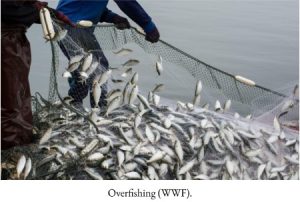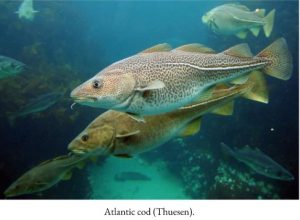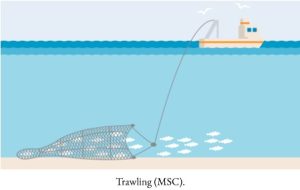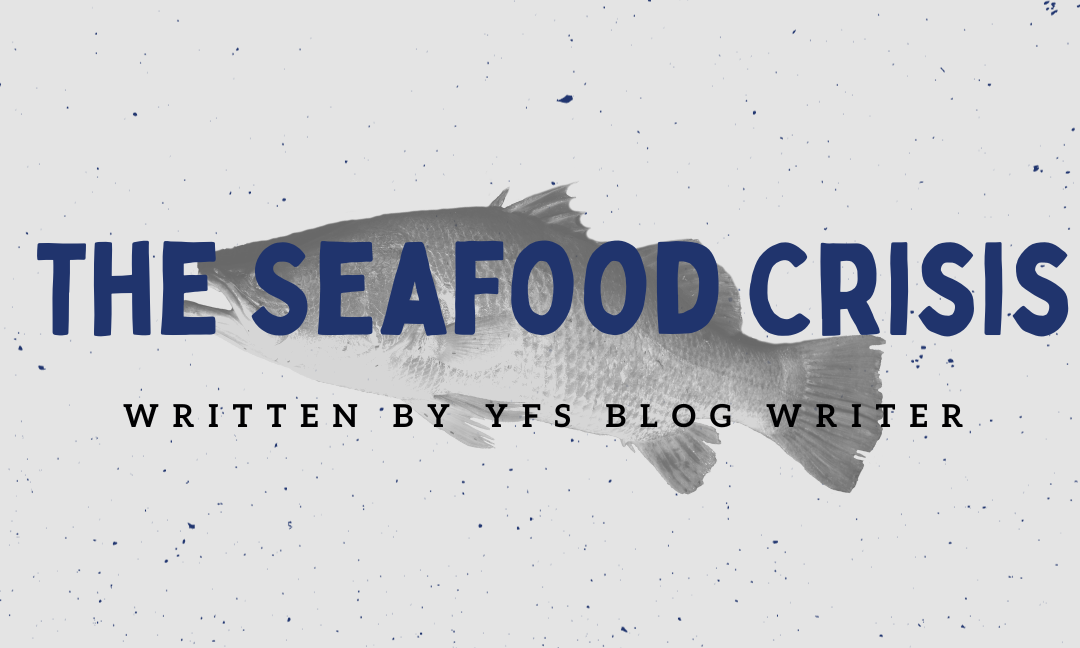Written By: YFS Blog Writer
Edited By: Kiritika Rana
Designed By: Cece Ndiwa
Published By: Maryam Khan
The rate at which fish and other sea creatures are consumed today is unsustainable, causing irreparable harm to the oceanic ecosystems and particularly threatening global fish populations. Overfishing refers to a rate or level of fishing that is not sustainable, i.e. that impedes the rebuilding or recovery of a fish stock (Government of Canada). If both seafood consumption and production continue on their current trajectories, the world’s oceans could effectively be emptied of fish by 2048 (“Global Challenges”). For those unaware, this is only 25 years away, meaning it is possible that within our lifetime fish will become a scarce resource.

Which marginalized groups are affected by overfishing?
Indigenous people would be particularly affected by the decreasing fish populations predicted to start. For many cultures and groups of people, particularly indigenous people, fish play a critical role in cultural practices and community building. A study found that coastal indigenous peoples eat nearly four times more seafood per capita than the global average, and about 15 times more per capita than non-indigenous peoples in their respective countries (Ota). Not only is fish nutritious-filled with beneficial fatty acids, vitamins, and minerals for indigenous people, but fish also plays a role in ceremonial traditions, creating important ties between families and individuals and embodying their symbolic ties to the environment (Ota). If not only for its high nutritional value, fish is so much more to many cultures and groups of people. Yet, losing this source of food would mean particularly indigenous peoples would have to change their diet due to their heavy reliance on fish in the present day.
Additionally, the social and economic health of many nations continues to be threatened by overfishing, where low-income, developing island nations are particularly at risk. In many cases, fishing is a key component of the traditional diet of these countries’ populations, making it more than just an essential aspect of their economies. Fish may comprise as much as 50% of the protein in a standard diet in several coastal African and South Asian countries (Government of Canada). Some of the world’s poorest people are finding it more difficult to access this valuable resource due to the fall in coastal fish supplies brought on by overfishing and illicit fishing practices.

What’s Canada’s relationship to overfishing?
Canada’s fisheries are among the most strictly controlled in the world, yet the country is nevertheless susceptible to the impacts of overfishing. One of the most frequently mentioned cases of overfishing in Canada is the collapse of the Atlantic Canada cod fishery in the 1990s, as it had devastating effects on the economy, society, and culture.
Other fisheries, like lobster and shrimp, have provided alternatives for some fish harvesters since the collapse of the cod and the ensuing cod fishing moratorium, which has been in place since 1992. However, many harvesters were forced to give up fishing and a way of life passed down from generation to generation. Hundreds of people have left the fishing industry in search of employment in different industries or professions, and in many cases, in different regions of Canada (Government of Canada).

What is being done?
On March 4, 2023, members of the UN signed the High Seas treaty. This is a step towards preserving life below water and leaving behind us a sustainable world for our children. The High Seas Treaty aims to help place 30% of the seas into protected areas by 2030, to safeguard and recuperate marine nature (Stallard). Before this, the last international agreement on ocean protection was signed 40 years ago in 1982, showcasing that a new sea treaty was long overdue (Stallard). Additionally in 2012, China banned trawling as a method of fishing due to the severe depletion of fish stocks off the coast of Hong Kong (Stallard). Trawling refers to a method of fishing with a large net to trap all marine life within the area the net is. This is an unselective method of harvesting fish as all fish within the confines of the net are captured and brought to the surface, even those which may be endangered or which are not commercially bought and sold. This ban on trawling hopes to preserve the oceanic environment off the coast of Hong Kong as a way of mitigating the negative effects on marine life.
There is hope that if we all acknowledge how threatened our marine life currently is, we can put measures in place to prevent further destruction of habitats or extinction by overfishing. Simply, be mindful of your fish consumption. By ensuring we as individuals are not supporting illegal fishing practices, we can create a world of sustainable, regulated fishing. Yet, consumers can’t do everything by themselves. There needs to be intervention on corporate, national, and global scales to ensure the protection of marine ecosystems. If possible, donate to organizations such as the Canadian Wildlife Foundation which are fighting toward more sustainable oceans.
Works Cited
“Global Challenges .” The World Counts, TheWorldCounts, https://www.theworldcounts.com/challenges/planet-earth.
Government of Canada, Fisheries and Oceans Canada. “Government of Canada.” International Fisheries, / Gouvernement Du Canada, 3 Feb. 2009, https://www.dfo-mpo.gc.ca/international/isu-global-eng.htm.
MSC. “Demersal or bottom trawls.” Marine Stewardship Council, 2023, https://www.msc.org/what-we-are-doing/our-approach/fishing-methods-and-gear-types/demersal-or-bottom-trawls
Ota, Yoshitaka, and Andrés Cisneros-Montemayor. “For Indigenous Communities, Fish Mean Much More than Food.” The Conversation, 19 Oct. 2022, https://theconversation.com/for-indigenous-communities-fish-mean-much-more-than-food-70129#:~:text=Seafood%20is%20crucially%20important%20to,symbolic%20ties%20to%20the%20environment..
Stallard, Esme. “Ocean Treaty: Historic Agreement Reached after Decade of Talks.” BBC News, BBC, 5 Mar. 2023, https://www.bbc.com/news/science-environment-64815782.
Thuesen, Gretchen. “Atlantic Cod: The Good, the Bad, and the Rebuilding – Part 2.” Sustainable Fisheries UW, 14 Feb. 2019, https://sustainablefisheries-uw.org/fishery-feature/atlantic-cod-part2/.
WWF. “What Is Overfishing? Facts, Effects and Overfishing Solutions.” WWF, World Wildlife Fund, https://www.worldwildlife.org/threats/overfishing.

